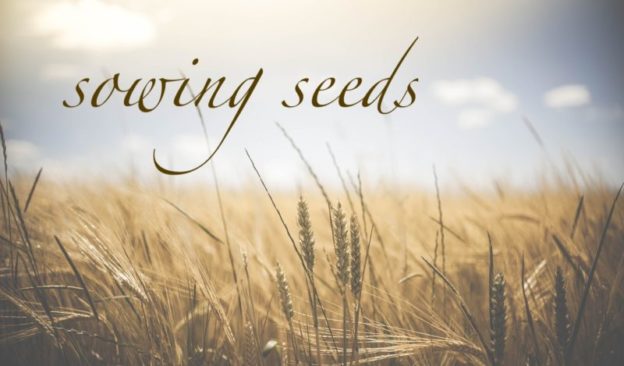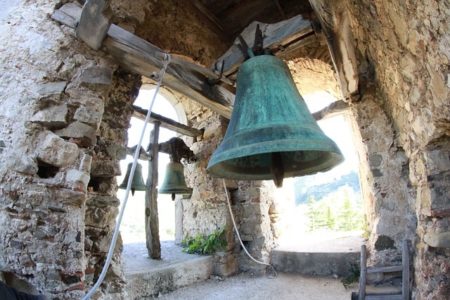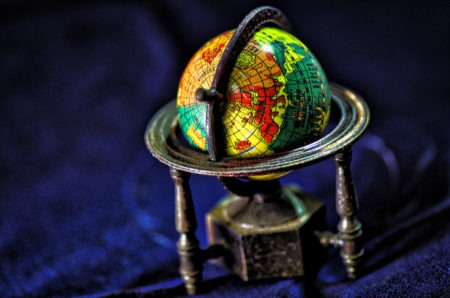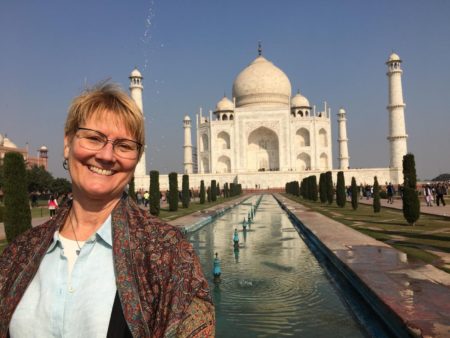By Rev. Dr. Kimberly Reisman, Executive Director
People have different ways of approaching reality. Some are analytical, reasoned, and logical. That’s not me. Not that I can’t be analytical, reasoned and logical. I can, but those are deliberate disciplines that I practice in contrast to my instinctive way of approaching the world, which is through my feelings. I’m just a feeling kind of person.
Maybe too much sometimes. When people talk about having certain spiritual gifts I always say I have the spiritual gift of weeping – I cry at weddings and baptisms and movies. I can’t sing Charles Wesley’s hymn And Can It Be without getting choked up. There’s just something about the words, “Amazing love! How can it be that thou, my God, shouldst die for me?” I’m not a very good singer, but I love to belt those words out. Toward the end of the song it says, “My chains fell off, my heart was free, I rose, went forth, and followed thee.” At that point I usually have to keep myself from jumping up and down with gratitude and joy.
Jumping up and down to Charles Wesley – go figure.
Not surprisingly, I resonate with Scriptures like Paul’s word in Romans: You received God’s Spirit when he adopted you as his own children. Now we call him, “Abba, Father.” For his Spirit joins with our spirit to affirm that we are God’s children. (8:15-16, NLT) That kind of gut-oriented experience of the faith is foundational for me. I’m a true daughter of John Wesley, whose heart was “strangely warmed.”
This gut-oriented way of approaching the world made a recent encounter very disorienting. I was approached by a young woman toward the end of a weekend of preaching. She earnestly asked how she could really know that God loved her if she couldn’t feel it. She had heard me preach three times already and had been involved in my three-hour teaching session on faith sharing. It was now about 5 minutes before the last service was to start and she was desperate to know if what I’d been talking about all weekend long was really true.
Was it really true that God loved her enough to become human in Jesus; was it really true that God’s love for her was radical enough to involve passionate sacrifice? She was sure it was true for everyone else since they could feel it; but it couldn’t possibly be true for her because she couldn’t. She continued that it wasn’t just about feeling God’s love. She couldn’t feel anything. Things had happened in her past and she had dealt with them by repressing, pushing down and blocking out any and all feeling within her. I have no feelings, she said and as I looked into her eyes, I believed her.
How is it that we come to know God’s love? Is it only when we feel God’s Spirit “bearing witness” with our spirit? Is it only when our hearts are “strangely warmed?” If we’re not a “feeling kind of person,” does God not work in us and through us anyway?
I was struggling as the woman patiently waited for my response. Then I remembered St. Patrick’s ministry in Ireland.
Way back in the mid-400’s Patrick began traveling in that country, moving from settlement to settlement, staying with the people, loving them and working among them. Through his ministry, monastic communities sprang up. These communities were different from what we normally think of when we think of monastic communities where monks separated themselves from the rest of society for a life of solitude and prayer. These were communities of committed Christ followers who lived and worked together, sharing resources, love, and life together. There were men and women, adults and kids; some were single, some were married, some had families – some were priests but most weren’t, and they were all together in community.
One of the things that made these communities so cool was the way they treated outsiders. There was always a gatekeeper – not to keep anybody out – but to be on duty all the time so that anyone who wanted to come in could come in, no matter what time of the day or night it was. If you visited the community, the gate keeper would welcome you first and then call everyone to come greet you. The abbot or abbess (head of the community) would immediately come out to make sure you felt at home. It wouldn’t matter what people were doing, they would stop because making guests feel welcome was more important than anything else. Then they’d show you to the guest house – the best accommodations in the whole place. When it was time to eat, you’d eat at the head table with the abbot/abbess. It would be clear that you could stay as long as you wanted, but you were also free to leave at any time. You could eat with the community, work with the community, worship with the community – always welcome to share in everything about the community. If you stayed for a while they’d assign you a ‘soul friend’ to talk to – no agenda – just about whatever was on your mind. Eventually, if you continued to stay they’d talk to you about God’s love and offer you the opportunity to become more than a guest.
It was a slow process of revealing God’s love; a process that started with the concept of belonging and acceptance and moved only gradually toward commitment. It was a process that took time because it was about providing evidence of God’s love. Not evidence in the form of skilled argument or tight logic; not even the evidence of a specific feeling even though that was probably part of it for most people. It was the evidence of action – consistent actions of love, continued day in and day out, actions that made God’s love visible and tangible and real through the welcoming, caring, support, and nurture of people. Evidence through action that God loves people and values them simply because they are.
The worship leaders were ready to begin as I stood front and center in the sanctuary with this woman who wanted to know if it was true that God really did love her. Remembering those communities founded by St. Patrick, I asked her why she came to this particular church. She said that the people were kind to her and took her in when she returned to town after a long absence. In the few years since she’d been back, they had consistently helped her and her children. Over and over they had been there for her – even in really difficult times. It was as though they had made space – just for her. She hadn’t had to earn it, or demand it, or even fight for it. They had simply offered it to her, time and time again.
We live in a broken and hurting world, a world where some live by feeling but others do not. A world where some will be able to feel God’s Spirit moving in their lives right from the very start – but others may not.
My mother always told me that people may doubt what you say, but they will always believe what you do. Evidence through action. That’s how you know.
This post also appeared on The Exchange with Ed Stetzer


 March 11-15, 2019 ~ Order of the FLAME – St. Simons Island, Georgia, USA
March 11-15, 2019 ~ Order of the FLAME – St. Simons Island, Georgia, USA

 view the summit on Facebook on The Salvation Army International Social Justice Commission page, where sessions are live-streamed.
view the summit on Facebook on The Salvation Army International Social Justice Commission page, where sessions are live-streamed.
 Our annual invitational faith sharing conference for North American clergy and clergy spouses of multiple denominations is gathering at St. Simon’s Island, Georgia, a historic Wesley location tucked on the Atlantic under towering oaks and rustling Spanish moss. The
Our annual invitational faith sharing conference for North American clergy and clergy spouses of multiple denominations is gathering at St. Simon’s Island, Georgia, a historic Wesley location tucked on the Atlantic under towering oaks and rustling Spanish moss. The 
 The complex dynamics of living missionally in a postmodern, post-Christendom context will be probed and dissected in the beautiful, historic setting of the University of Durham this August in a brand-new gathering called Convergence. Leading thinkers and practitioners will discuss compelling issues like the relationship between science and faith, the monastic and the missional, globalization and migration, and more. This is an open event for clergy and church leaders. Following a time of equipping in Durham, participants are also welcome to engage in a Wesley heritage tour including stops in Epworth, Bristol, and London.
The complex dynamics of living missionally in a postmodern, post-Christendom context will be probed and dissected in the beautiful, historic setting of the University of Durham this August in a brand-new gathering called Convergence. Leading thinkers and practitioners will discuss compelling issues like the relationship between science and faith, the monastic and the missional, globalization and migration, and more. This is an open event for clergy and church leaders. Following a time of equipping in Durham, participants are also welcome to engage in a Wesley heritage tour including stops in Epworth, Bristol, and London.

 Currently, I’m in Delhi, India teaching at our North India Regional Evangelism Seminar. While here, Director of Development Bonnie Hollabaugh and I had the opportunity to visit the Taj Mahal in Agra. What an experience! This beautiful and extraordinary monument to love is well worth its distinction as one of the world’s wonders.
Currently, I’m in Delhi, India teaching at our North India Regional Evangelism Seminar. While here, Director of Development Bonnie Hollabaugh and I had the opportunity to visit the Taj Mahal in Agra. What an experience! This beautiful and extraordinary monument to love is well worth its distinction as one of the world’s wonders. The Taj Mahal is stunning for a variety of reasons. Its symmetry is stunning. Everything about it is perfectly balanced. It is inlaid with precious and semi-precious stones, all hand-carved and embedded in marble in intricate floral patterns. The craftsmanship is so astonishingly smooth that from a distance it appears that the flowers have been painted rather than inlaid. And it is a brilliant white. That’s because it is constructed out of a uniquely translucent, nonporous marble found only in India. Because it is translucent, it almost glows as the light moves through it. Because it is nonporous, nothing can penetrate it or stain it or discolor it, so even after many centuries, it is as white as it was when it was first constructed. All that has been required is for it to be washed with soap and water.
The Taj Mahal is stunning for a variety of reasons. Its symmetry is stunning. Everything about it is perfectly balanced. It is inlaid with precious and semi-precious stones, all hand-carved and embedded in marble in intricate floral patterns. The craftsmanship is so astonishingly smooth that from a distance it appears that the flowers have been painted rather than inlaid. And it is a brilliant white. That’s because it is constructed out of a uniquely translucent, nonporous marble found only in India. Because it is translucent, it almost glows as the light moves through it. Because it is nonporous, nothing can penetrate it or stain it or discolor it, so even after many centuries, it is as white as it was when it was first constructed. All that has been required is for it to be washed with soap and water. And here is the point at which the Taj Mahal made its impact on me. In the midst of all this beauty, perfection and symmetry, there is one thing that is not in balance – the tomb of the very man who determined to build this flawless shrine. He is buried to the left of his beloved wife, the one thing out of kilter in the midst of seeming perfection, symmetry, and balance.
And here is the point at which the Taj Mahal made its impact on me. In the midst of all this beauty, perfection and symmetry, there is one thing that is not in balance – the tomb of the very man who determined to build this flawless shrine. He is buried to the left of his beloved wife, the one thing out of kilter in the midst of seeming perfection, symmetry, and balance.